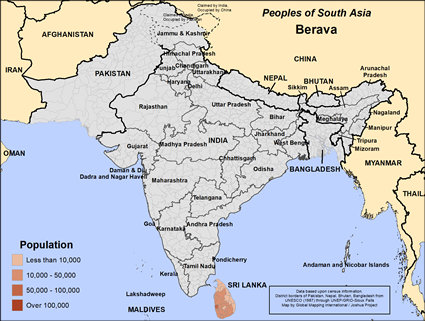The Berava people of Sri Lanka primarily speak Sinhala, the dominant language of the Sinhalese majority. Historically, the Berava caste is associated with drumming and ritual performance in Buddhist ceremonies. Their name derives from the Sinhala word bera, meaning "drum," which itself comes from the Sanskrit bher? for "kettle drum." Anthropologists trace their origins to South Indian communities, likely connected to the Paraiyar caste, who migrated to Sri Lanka centuries ago to fulfill specialized roles in temple rituals and village ceremonies. Over time, Berava families became integral to Sri Lanka's cultural life, providing music and ritual services for Buddhist temples and royal courts. Despite their contributions, they were historically marginalized under the caste system and faced social discrimination during colonial and post-colonial periods.
Traditionally, Berava families earned their livelihood through drumming at religious festivals, weddings, and funerals. Many were also skilled in related arts such as dance, mask-making, astrology, and crafting ritual objects. Today, while some continue these cultural roles, younger generations often seek alternative employment due to the stigma attached to their caste identity. Economic challenges persist, especially in rural areas where opportunities are limited. Social mobility has improved somewhat through education, but caste-based prejudice still influences marriage and community interactions. Urban migration has opened new possibilities, yet many Berava remain economically vulnerable and dependent on seasonal cultural work.
The Berava are overwhelmingly Theravada Buddhists, but their spiritual life often blends orthodox Buddhism with folk practices. Ritual drumming is central to ceremonies intended to appease spirits, demons, and deities, reflecting a strong belief in the unseen world. Many Berava families maintain traditions of spirit possession, cursing ceremonies, and offerings to Hindu gods alongside Buddhist observances. These practices reveal a worldview deeply rooted in fear and ritual obligation rather than the hope and grace found in the gospel. There is little exposure to biblical teaching, and evangelical presence among them exists, but it's small.
Persistent caste stigma continues to limit social advancement for Berava families, even as modern economic systems evolve. Access to quality education and vocational training is essential for breaking cycles of poverty and marginalization. Health care and stable employment remain pressing concerns, especially for those in rural communities. Spiritually, the Berava need freedom from fear-based rituals and the transformative power of the gospel. Without intentional discipleship, cultural Christianity or nominal Buddhism will not lead to genuine spiritual renewal. There is also a need for leadership development within emerging Christian communities so that Berava believers can grow strong in faith and join the global mission movement.
Pray for God's provision of education, jobs, and healthcare for Berava families struggling with poverty and social exclusion.
Ask the Lord to send faithful workers who will share the gospel and disciple new believers among the Berava.
Intercede for spiritual breakthrough, that fear-driven rituals would be replaced by trust in Christ and His saving grace.
Pray for unity and courage among Berava Christians, that they would overcome caste stigma and become bold witnesses in their communities.
Lift up the next generation, that they would embrace Jesus personally and join the global discipleship force.
Scripture Prayers for the Berava in Sri Lanka.
Berava (caste) – Wikipedia
Cultural Ambivalence: A Socio-Historical Account of the Berava Caste
Caste Discrimination and Social Justice in Sri Lanka
The Impact of Social Caste System on Traditional Drum Players
| Profile Source: Joshua Project |











